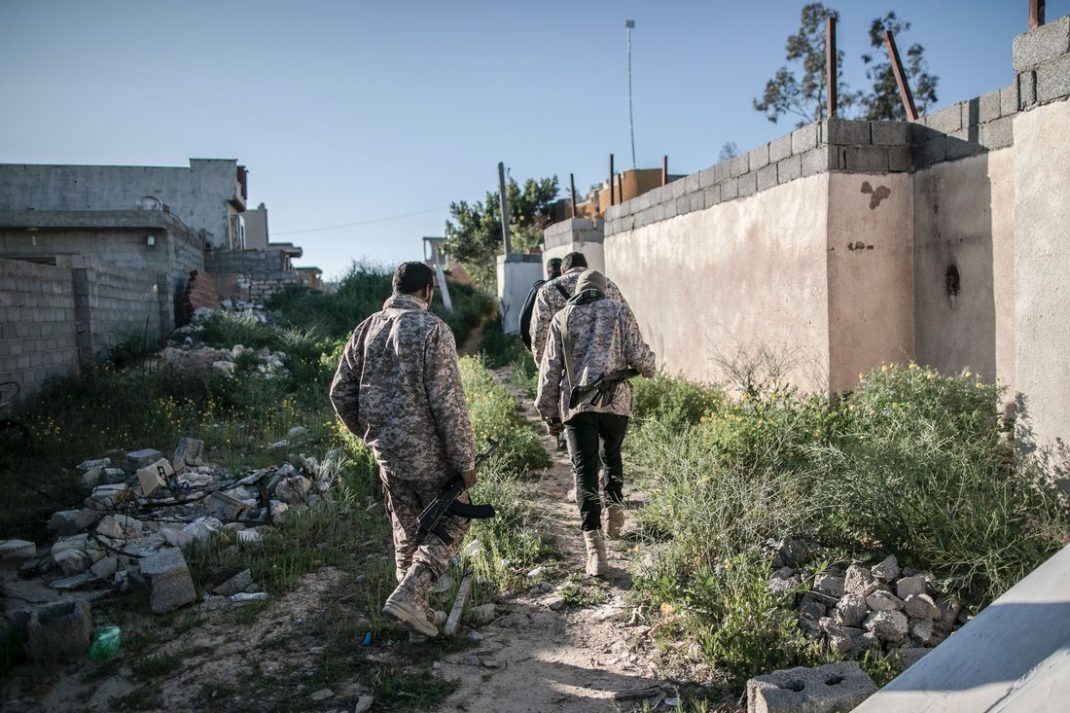Community Dynamics and Economic Interests
By Tim Eaton, Abdul Rahman Alageli, Emadeddin Badi, Mohamed Eljarh, and Valerie Stocker
 This paper is based on approximately 200 interviews carried out by the authors – in person and remotely – with a wide range of Libyan actors between November 2018 and September 2019. This the paper does not claim to cover all armed groups in the country.
This paper is based on approximately 200 interviews carried out by the authors – in person and remotely – with a wide range of Libyan actors between November 2018 and September 2019. This the paper does not claim to cover all armed groups in the country.
(10)
Armed Groups in Southern Libya .. cont.
The functions of armed groups
Communities rely on social actors and armed groups for security and justice. Security is seen as a collective responsibility that requires the collaboration of both formal and informal actors, at least in smaller towns and at the neighbourhood level.
‘In the absence of the state as security provider, social components are the best alternative we have,’ a municipal worker in Sebha told Chatham House in March 2019.
Formal security providers may be present, but lack the operational capacity and authority to do their job.
Hence, irregular armed groups often assume policing functions within limited zones, usually in consultation with social leaders and on the basis of customary justice mechanisms. Sometimes such groups collaborate with formal judicial bodies.
Outside cities, armed groups guard roads and occasionally perform other services, such as providing security for deliveries of central bank cash, transporting equipment to municipalities, or sweeping sand off otherwise impassable desert roads.
Residents sometimes appeal to armed groups to help them tackle public service problems, or to pressure state entities into delivering better services.
Yet the services that armed groups render to communities also allow them to justify their presence and generate revenue. Armed actors do not have a monopoly on agency in the areas under their control, nor do they act independently from the social setting.
Sometimes armed actors come under pressure from their home communities to convey broader social demands to the state, such as for better public services, local development projects and jobs. For example, in Ubari, groups of protesters have blockaded the Sharara oil field on several occasions since 2013.
Ironically, they have been aided by the very armed actors whose mandate was to protect the facilities.
In 2014, this prompted the government to introduce a recruitment plan and set up a technical training institute to build local capacity. Although the security context and actors have since changed, a similar situation occurred in December 2018.
Commanders of the Sharara oil guard endorsed the Fezzan Anger Movement and allowed it to enter the facility, prompting the NOC to declare force majeure at the field.
In parallel to negotiations with the oil guard, the GNA presented a development fund for the south to appease protesters and their communities.
This does not mean that armed groups act selflessly – oil blockades also often involve financial demands by armed groups. The territorial segmentation of the south can facilitate law enforcement and the creation of ‘safe zones’.
Interviewees from across the Fezzan explained that travelling within zones of tribal influence is usually safe, at least for people from those areas. Social means of control and conflict resolution still exist, and armed groups to some extent remain accountable to their communities.
Sebha provides an interesting case study of the achievements and shortcomings of neighbourhood-based security provision. Since 2017, tribal armed groups in different parts of the city have organized what are termed security ‘rooms’ (i.e. command centres), with some coordination at the city level.
Given the lack of an overall security body trusted by all the different constituencies – some at war with each other – to deal with security incidents objectively, the system instead relies on each neighbourhood ‘room’ policing its own area, detaining suspects from its tribe(s), and handing over individuals from outside its zone of operations to the relevant entity.
This is done in coordination with the Sebha Joint Security Room and, sometimes, judicial authorities. The arrangement is susceptible to tribal bias, allows criminals to be shielded in the community, and offers limited oversight and accountability.
Nonetheless, it has facilitated management of security, in particular creating links between armed actors from different tribes while limiting the risk of conflict escalation and tit-for-tat retaliation.
In some cases, tribal armed groups appear to have had a positive impact beyond addressing security threats and crime.
Some interviewees for this paper identified Abdelkafi, on the northern edge of Sebha, as a case in point. This predominantly Magarha neighbourhood consists mainly of residential areas and farmland, with little urban infrastructure.
In recent years, services and trade have boomed, and businesses have relocated to Abdelkafi from other parts of the city. Stores and workshops have opened, along with commercial bank branches and a local passport office.
These developments have largely been enabled by the presence of a neighbourhood battalion, which has executed its security role efficiently.
At the same time, territorial segregation curtails mobility and puts civilians at risk. While southerners tend to feel safe in the areas where they live, many dread travelling to other cities or in some cases even to other neighbourhoods.
The risks travellers face range from low-level extortion and harassment at checkpoints to armed robbery, kidnapping for ransom or even identity-based killing (i.e. based on the traveller’s tribal or family affiliation).
When tribal factions are at war, civilians may be targeted. Over the past few years in Sebha, it has often been unsafe for people to venture into neighbourhoods dominated by another tribe. This has curtailed access to essential public services.
One interviewee recounted that he had not entered central Sebha since 2014 for fear of being identified as Tebu at any of the checkpoints controlled by Awlad Suleiman groups.
A Gaddadfa youth activist said that for years members of his community in northern Sebha had been scared of going to the municipal medical centre – located in the south of the city – and that healthcare problems were only alleviated when a clinic opened in their area.
Members of the Awlad Suleiman tribe have not been able to travel safely south of Sebha into Tebu-held areas or across the borders into Chad or Niger; this has had a lasting impact on businesses and trade relations. Mobility is especially curtailed for women.
Interviewees in Sebha said that women are usually accompanied by male family members even when going to school, work or to run errands.
Travel is further complicated by fact that southerners tend to rely on transport by car, including when going to the north or to Tunisia, given that air travel from the south is limited.
Revenue generation and resource mobilization
Southern armed groups exploit their control of territory and strategic facilities to extract rents from the state, to enable (and profit from) illicit trade flows, and sometimes to engage in violent extortion and banditry.
Southern Libya’s economy largely relies on the informal sector, specifically informal trade and smuggling of all sorts.
This is in part reflects the socio-economic environment, given a lack of access to higher education or public sector employment and an underdeveloped private sector.
While much informal economic activity is not illegal, it largely takes place outside of state oversight. Traders sometimes attempt to fulfil formal requirements – such as business registration, and payment of taxes and customs fees – where necessary, but ignore them where there is no state supervision.
Southern cross-border trade takes place in a grey zone: there are no formal customs controls between Libya and neighbouring Chad, Niger, Algeria and, to a lesser extent, Tunisia.
The line between formal and informal, legal and illegal, is thus blurred, with economic activity conducted in a space where formal rules are rarely applied, and where official and unofficial security actors exist side by side.
Business practices in southern Libya are structured according to tribal power dynamics. Armed groups discriminate heavily between people of their own tribe and others, for example in terms of who they let pass through checkpoints and at what price.
Merchants mostly prefer to operate in territory where their tribe is dominant, as this makes logistics easier and provides a degree of security.
As a result, trade and smuggling routes are segmented. Transportation of merchandise is a multi-step process, in which goods change hands at the boundaries between tribal zones of influence, with different actors taking over at each boundary and transporting goods to the next hand-over point.
For instance, fuel smuggled from Zawiya to the south may be handled by three or four different actors or groups of actors, depending on the territory it crosses.
The handover process involves the two parties determining a safe location for the exchange of merchandise and payment. For the buyer, a safe location usually means somewhere outside the tribal zone of influence of the seller.
As a fuel smuggler in Ubari explained, when buying a large quantity of fuel in Wadi al-Shati, payment is made through an intermediary and the money only disbursed once the vehicle transporting the fuel has left the Magarha tribe’s zone of control and reached Sebha. Fewer precautions are taken for
smaller quantities of fuel, which are exchanged at known ‘marketplaces’, such as the small locality of Adiri on the southern edge of Wadi al-Shati, at which retailers can buy or order directly without an intermediary.
***
About the Authors:
Tim Eaton is a senior research fellow with the MENA Programme at Chatham House, where he focuses on the political economy of the Libyan conflict. Tim previously worked for BBC Media Action, the BBC’s international development charity, on projects in Iraq, Egypt, Tunisia and Libya, and helped to set up and manage its Libya bureau from 2013 to 2014.
Abdul Rahman Alageli is an associate fellow with the Middle East and North Africa Programme, based in Tripoli, Libya. He is currently an adviser to the GNA Chief-of-General Staff of the Libyan Army. Abdul Rahman previously worked with the stabilization team of the Libyan Prime Minister’s Office in 2011 before becoming the national security file coordinator in the Office of the Libyan Prime Minister and a member of the Libyan government’s National Security Coordination Team until 2015.
Emadeddin Badi is a researcher and political analyst who focuses on governance, conflict and the political economy of Libya. He has worked with multiple international development organizations and business risk firms as a consultant, and his analysis has been published widely.
Mohamed Eljarh is a Libyan affairs specialist who has covered Libya’s developments since 2011. He is the co-founder and CEO of Libya Outlook, and he acts as the regional manager for CRCM North Africa in Libya. Previously, Eljarh worked with the Atlantic Council and Foreign Policy magazine.
Valerie Stocker is a researcher who has studied Libyan politics and society extensively, mostly focusing on the southern region. She has worked with various development organizations since 2013, conducting fieldwork and analysis on conflict dynamics, peace processes, migration and other subjects. Valerie was based in Tripoli for several years starting in 2008, and has previously worked as a freelance journalist and business risk consultant.
_______________





